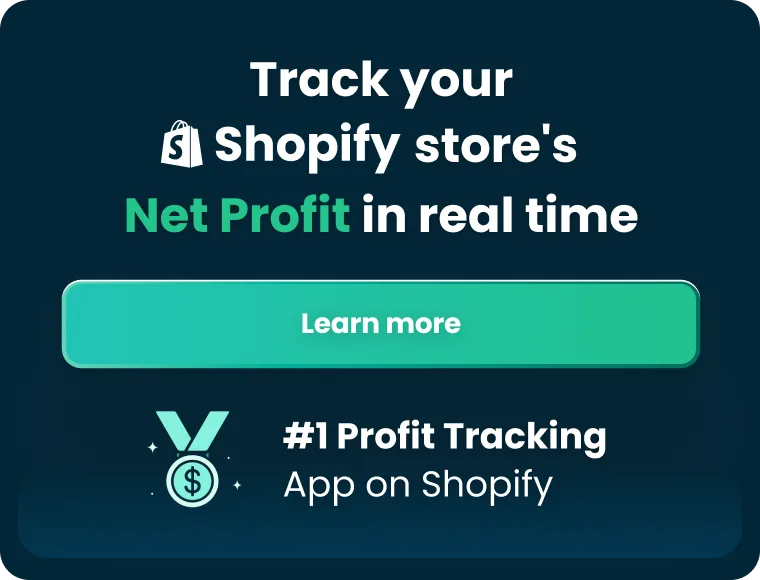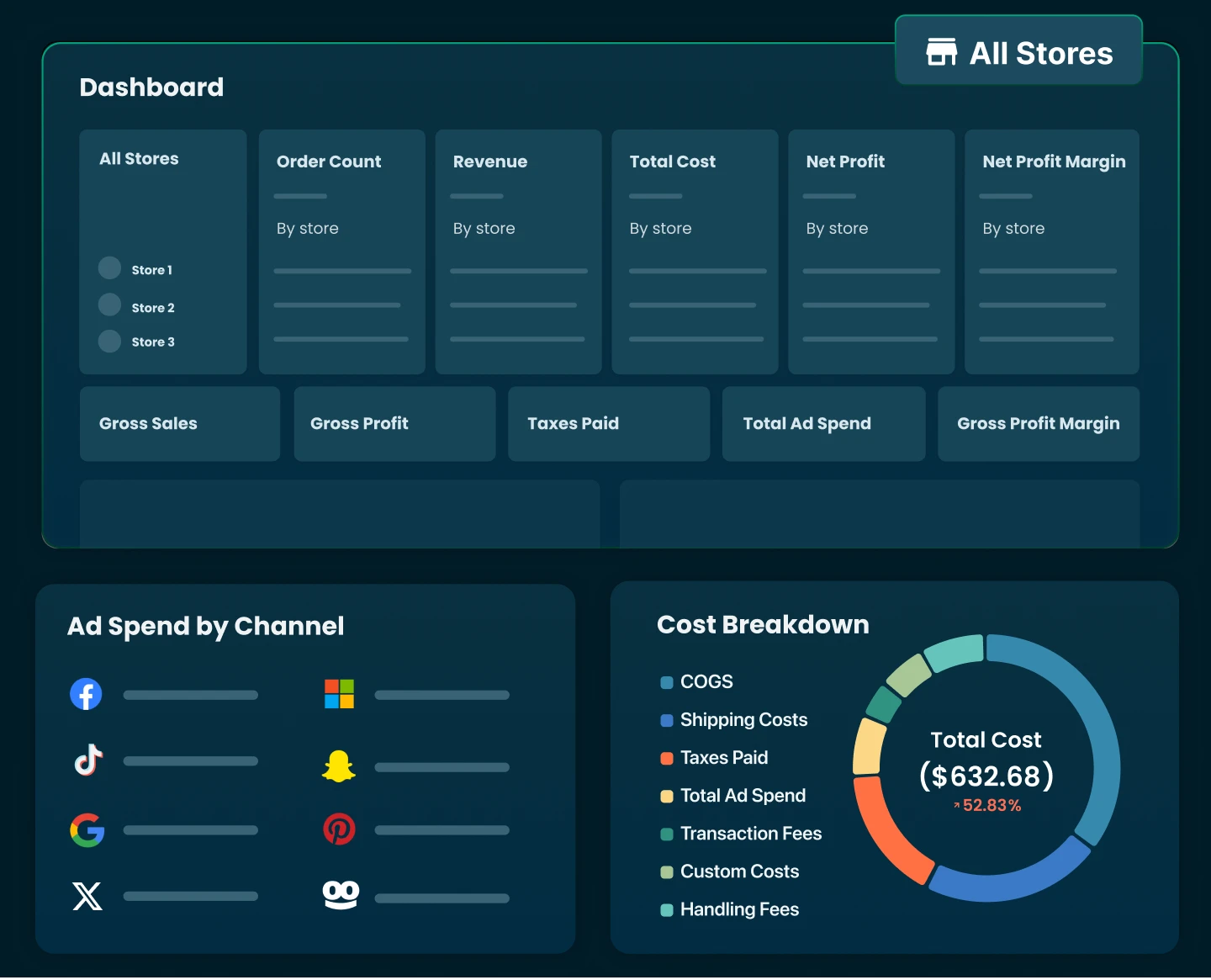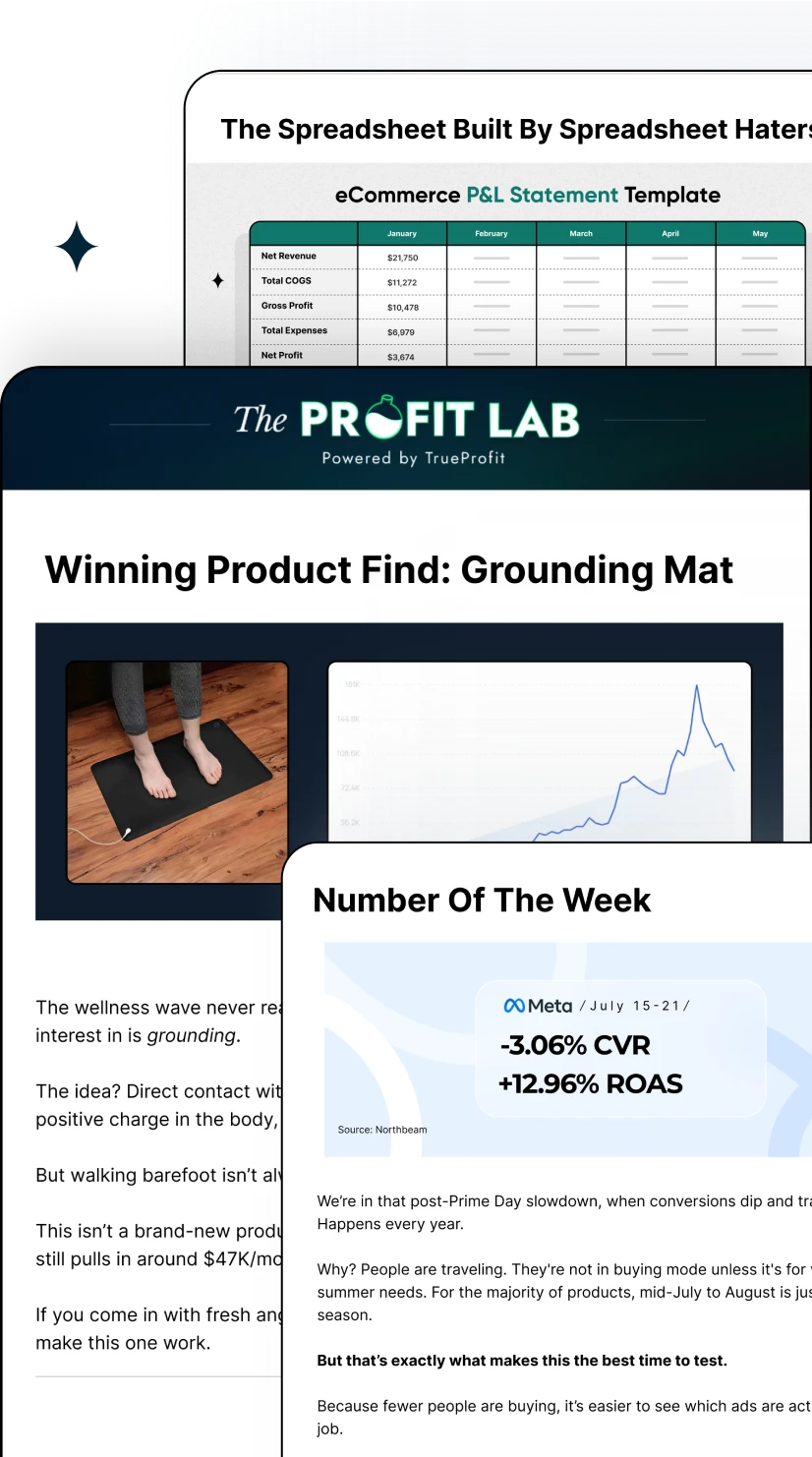10 of the Best Ecommerce Platforms for Dropshipping (2026)
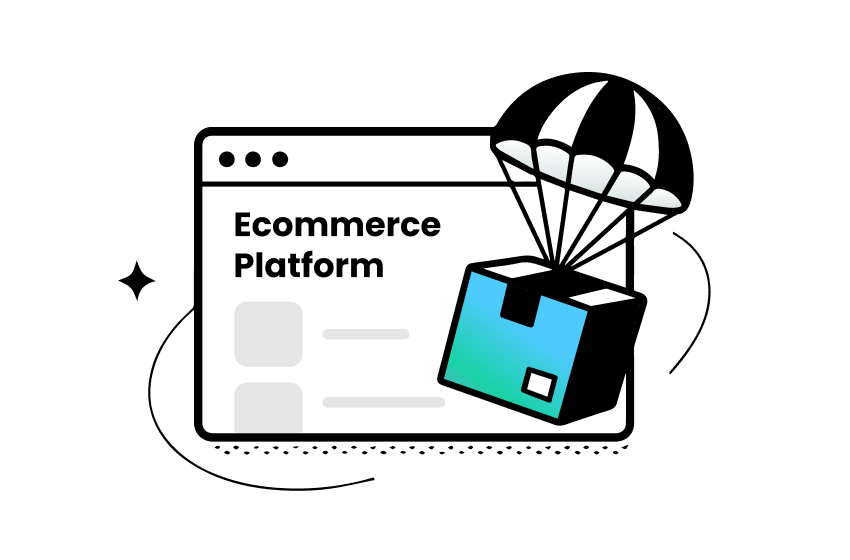
Starting a dropshipping business begins with choosing the right ecommerce platform. The platform retailers select determines how easily it is to set up, integrate, and manage stores along the way.
In this guide, we’ll look at the 10 best ecommerce platforms for dropshipping, break down their strengths and weaknesses, and share pricing details so you can make an informed choice.
In this blog:
What Makes a Good Ecommerce Platform for Dropshipping?
The best ecommerce platforms for dropshipping usually offer:
- Ease of use: Simple store setup in 1-7 days. Access drag-and-drop editors or pre-built templates for easy customization.
- Dropshipping integrations: Direct connections with dropshipping apps like DSers, Spocket, or Printful.
- Affordable pricing: Ideally below 3% per sale, ~$15–$50 per month for the core plan.
- Payment gateways: Secure, global payment options for international customers.
- Customization: Flexible design and branding options to stand out.
Here’s your catch: Choosing a selling platform isn’t just about finding a place to host a frontstore. The goal is to find a complete eCommerce ecosystem, one that helps retailers set up, manage, and operate dropshipping business as easily as possible.”
10 Best Ecommerce Platforms to Start Dropshipping
Here’s a quick comparison table before we dive deeper:
Platform | Best For | Quick Overview |
|---|---|---|
Shopify | All-in-one ecommerce solution | Pros: Ease of use & 8,000+ apps Cons: Extra cost for premium apps Pricing: Starts at $19/mo |
BigCommerce | Scalable businesses | Pros: Built-in advanced features for scaling Cons: Limited free themes; less beginner-friendly Pricing: Starts at $29/mo |
WooCommerce | WordPress users | Pros: Full customization & open-source control Cons: Requires technical skills & extra costs Pricing: Free core plugin (hosting varies) |
Etsy | Handmade & vintage products | Pros: Marketplace with niche audience Cons: Limited customization; high fees Pricing: $0.20/listing + transaction fees |
Wix | Design-focused stores | Pros: Drag-and-drop editor, customizable templates Cons: Less advanced dropshipping integrations Pricing: Starts at $16/mo |
TikTok Shop | Social commerce | Pros: Direct in-app selling & viral potential Cons: Limited analytics; trend-dependent Pricing: Free to join (transaction fees apply) |
Squarespace | Creative stores | Pros: Designer templates for branded storefronts Cons: Fewer eCommerce features than Shopify Pricing: Starts at $16/mo |
Big Cartel | Artist shops | Pros: Lightweight, simple platform for small creators Cons: Limited product listings & features Pricing: Starts at $10/mo |
Weebly | Budget-friendly stores | Pros: Affordable & beginner-friendly Cons: Limited scalability & advanced tools Pricing: Starts at $6/mo |
Ecwid by Lightspeed | Multi-channel selling | Pros: Sell on websites, marketplaces, social platforms Cons: Core plan limited to 5 products Pricing: Starts at $5/mo |
1. Shopify – Best for All-in-One eCommerce Solution
Shopify is an ecommerce platform built to help anyone start, run, and grow an online store. According to Marketing Scoop, there are approximately 4.8 to 5M+ active stores worldwide are using Shopify to run their business (including top dropshipping brands like Gymshark and Meowingtons).
Shopify makes selling simple by giving retailers all solutions they need—from building a professional storefront to accepting payments, managing products, handling shipping, and promoting a store with its built-in marketing features. You can also check out this extensive Shopify review on Cybernews.
What Shopify helps:
- Easily build a professional storefront (with 100+ store themes & drag-an-drop editor toolkit)
- Stable hosting during high-volume traffic season
- Sell across multiple channels such as Facebook, Instagram, TikTok, Amazon, Walmart, and eBay.
- Automated inventory & order management
- Get paid quickly and securely with built-in Shopify Payment
- Built-in marketing tools supported
- Built-in Shopify store analytics tools supported


Pros:
- Easy to set up and use
- Wide range of automation dropshipping apps
Cons:
- Transaction fees if not using Shopify Payments.
Customer Review:
Pricing: Paid plans begin at $19/month (billed yearly).
Here’s the breakdown:
Basic – $19/month. Best for solo entrepreneurs. Includes 10 inventory locations, in-person selling by phone or POS device, and 24/7 chat support.
Grow – $49/month. Best for small teams. Everything in Basic, plus 5 staff accounts.
Advanced – $299/month. Best for scaling brands. Everything in Grow, plus 15 staff accounts.
Plus – $2,300/month. Best for enterprise-level businesses. Everything in Advanced, plus unlimited staff accounts, 200 inventory locations, customizable high-volume checkout, B2B/wholesale features.
2. BigCommerce – Best for Growing Business
BigCommerce is an eCommerce platform that helps retailers build, manage, and scale their online stores, just similar to Shopify. What makes it different is its focus on built-in features that minimize the need for third-party apps.
What BigCommerce helps:
- Sell & manage large catalogs up to 600 SKUs per product and 250 product options
- Multi-channel sell across Amazon, eBay, Walmart, Facebook, Instagram, and TikTok
- Fast & secure checkout with over 55 payment gateways (PayPal, Stripe, Amazon Pay, etc.)
- Sell worldwide with 100+ currencies and multiple languages supported.

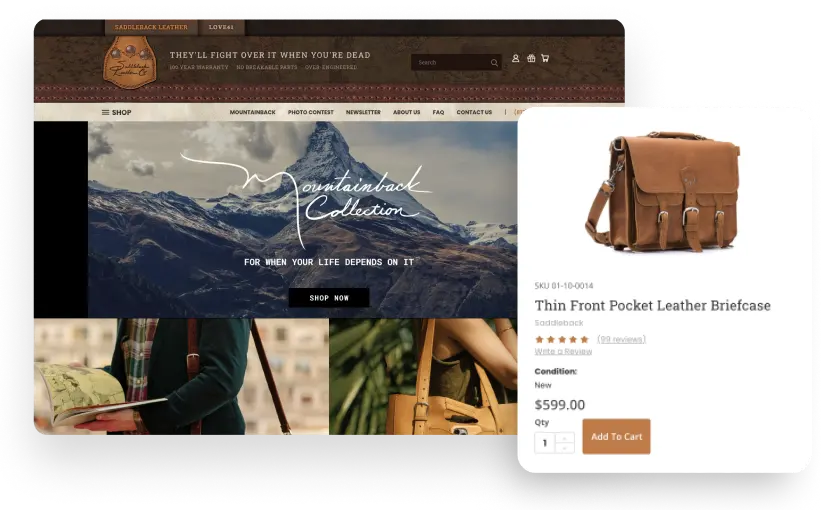
Pros:
- No transaction fees on any plan
- 55+ payment gateways with no extra cost
Cons:
- More complex setup than Shopify.
Customer Review:
Pricing: Paid plans start at $29/month.
Here’s the breakdown:
Standard – $29/month. Best for individuals and small brands. Includes up to $50K in online revenue, 0% added payment fees, and 24/7 live phone & chat support.
Plus – $79/month. Best for ambitious small businesses. Everything in Standard, plus higher limits with up to $180K in online revenue.
Pro – $299/month. Most popular plan. Best for fast-growing businesses. Everything in Plus, with capacity for $400K+ online revenue and advanced features to scale.
Enterprise – Custom pricing. Best for established businesses generating $1M+ in revenue. Includes tailored terms, enterprise-grade support, and scalability for high-volume needs.
3. WooCommerce – Best for WordPress Users
WooCommerce is an open-source WordPress plugin that turns any WordPress site into a fully functional online store. It’s especially popular for budget-conscious retailers because WooCommerce itself is free to install on any WordPress website. The only unavoidable costs are hosting (as low as $5–$30/month) and optional premium themes or plugins, making it one of the lowest-barrier entries to eCommerce.
What WooCommerce helps:
- Customize storefront with 8,000 free and paid WordPress plugins
- All product types (physical, digital, subscriptions, bookings, and memberships) supported.
- Flexible checkout with 100+ payment gateways— payments globally accepted.
- Full store data control —including customers, orders, and product information.


Pros:
- 100% free to install as a WordPress plugin.
- Over 1,000+ extensions and 800+ dedicated dropshipping
Cons:
- Requires hosting and technical know-how.
Customer Review:
Pricing: Free plugin + Hosting ($10–25/month) + Paid extensions.
4. Etsy – Best for Handmade and Vintage
Etsy is a global online marketplace where retailers sell handmade goods, vintage items (20+ years old), and craft supplies. Unlike platforms like Shopify or WooCommerce that are standalone store builders — Etsy is a marketplace with a built-in audience of over 95 million active buyers who have high purchase intent for unique, niche products.
What Etsy helps:
- Design a basic functional shopfront with not coding or hosting needed
- Offer 12+ payment checkout (credit cards, PayPal, Apple Pay, and Etsy Gift Cards, etc)
- Offsite ads supported to promote products on Google, Facebook, Instagram, Bing, and Pinterest.
- Automated shipping & fulfillment tools supported


Pros:
- Low entry-cost ($0 monthly subscription to start selling)
- Strong built-in marketing & SEO tools
- Etsy’s search algorithm make products discovery organic
Cons:
- Don’t support general dropshipping items
Pricing: Free to join. 6.5% transaction fee + $0.20 per listing.
Dropship Review:
5. Wix – Best for Design-Focused Stores
Wix is a website builder that helps retailers create a unique storefront with drag-and-drop freedom, animations, video backgrounds, and full design control. Over 55% of Wix users are small businesses or solo retailers who don’t have a developer — they pick Wix because they can build a professional-looking store on their own.
- Create a branded storefront using 900 free templates + Wix’s WYSIWYG (What You See Is What You Get) editor
- Store design automatically adapts to mobile
- Supports selling physical products, digital products, and services.
- Automatically manage product stock and fulfillment
- Support 50+ payment gateways including Wix Payments, PayPal, Stripe, and Apple Pay, etc
- Multichannel sell on Amazon, eBay, Instagram Shop, Facebook Shop

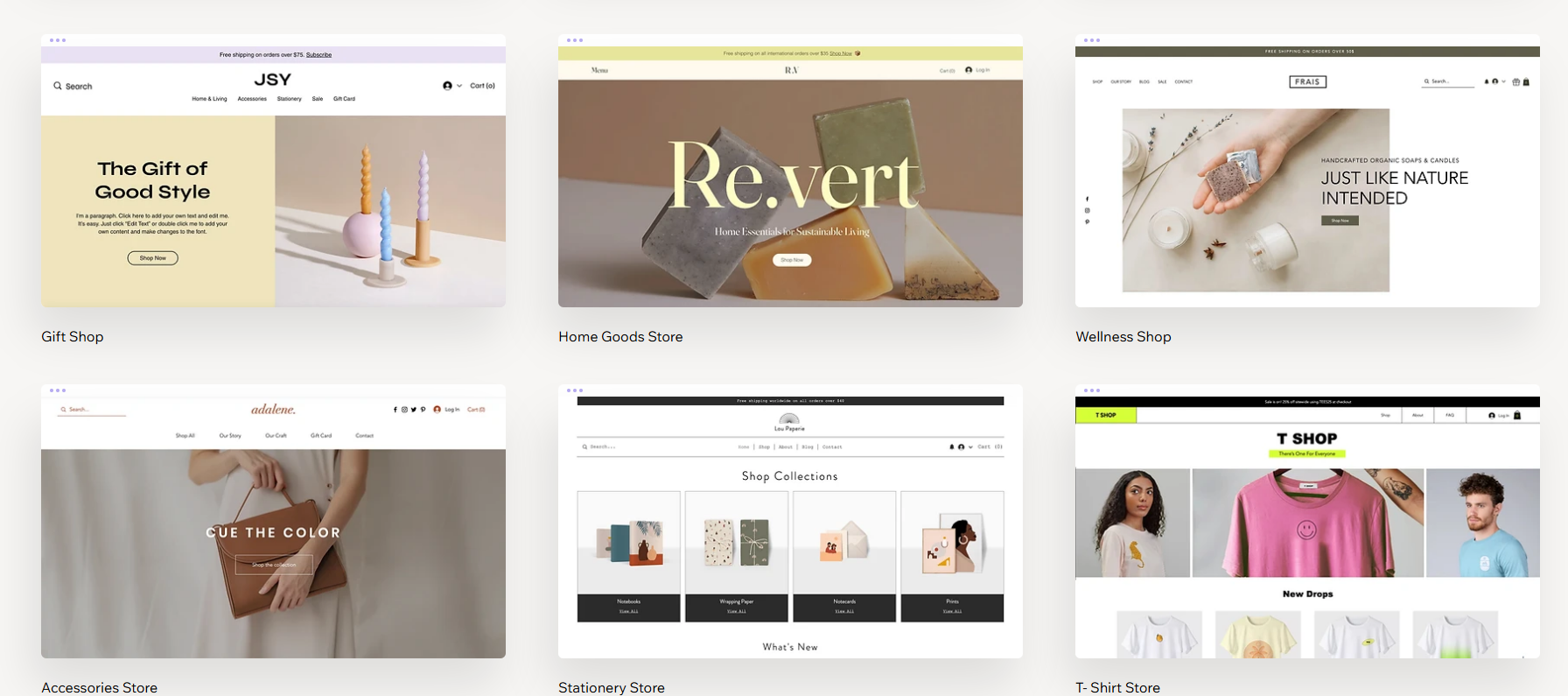
Pros:
- Supports large catalogs (up to 50,000 products)
- Over 500 apps available for dropshipers
- Affordable entry point at around $17/month
Cons:
- Limited scalability
Pricing: Paid plans begin at $17/month.
Here’s the breakdown:
Light – $17/month. Best for personal use or testing ideas. Includes free domain for 1 year, 2 GB storage space and 2 site collaborators.
Core – $29/month. Best for freelancers or small projects. Everything in Light, plus 50 GB storage space and 5 site collaborators.
Business – $39/month. Best for growing brands. Everything in Core, plus 100 GB storage space and 10 site collaborators.
Business Elite – $159/month. Best for scaling businesses. Everything in Business, plus unlimited storage space and 100 site collaborators.
Dropship Review:
6. TikTok Shop – Best for Social Commerce
TikTok Shop is an in-app eCommerce feature that lets retailers sell products directly on TikTok. It’s known for combining entertainment and commerce— this means products are fueled by TikTok’s recommendation algorithm and social trends, giving even small stores the chance to go viral and sell at scale.
What TikTok Shop helps:
- Create a TikTok Storefront where all listed products are promoted by TikTok’s algorithm.
- Support in-app checkout (purchase without leaving TikTok) — integrates with credit cards, PayPal, and local e-wallets.
- Allow to host real-time livestreams and showcase products with clickable purchase links.
- Built-in affiliate marketplace where connects retailers with creators

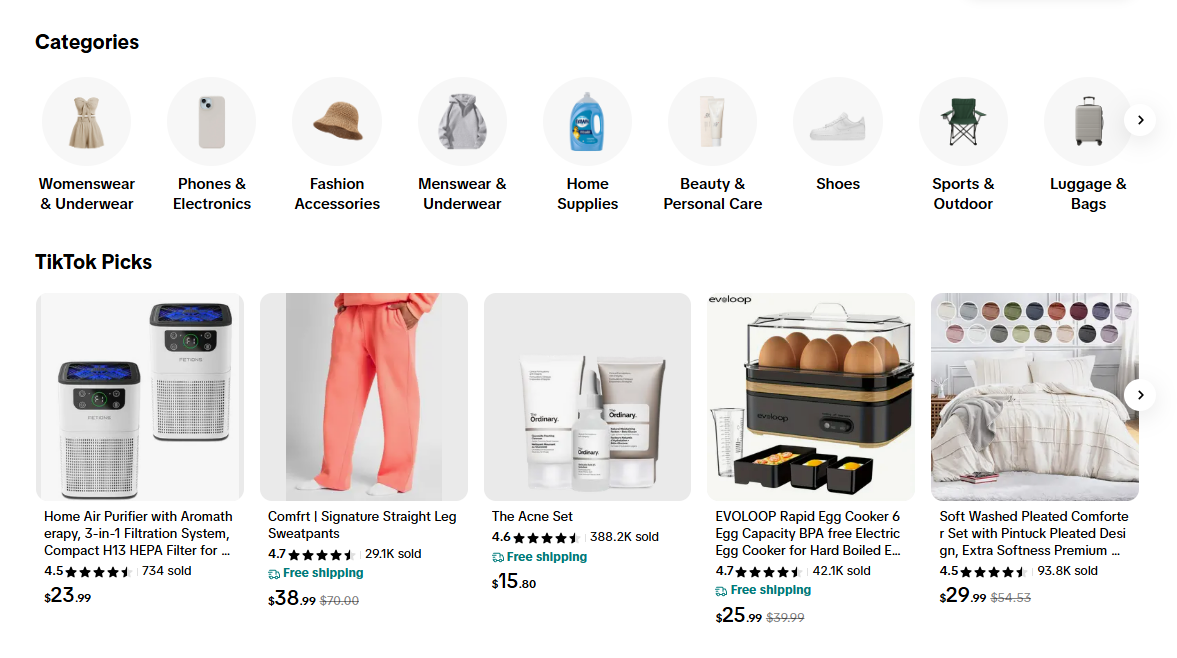
Pros:
- Active marketplace with 1.7+ billion monthly active users
- Easy to set up store without a website needed
- No upfront costs.
Cons:
- Limited to TikTok’s ecosystem.
- Commission-based fees can add up.
Pricing (Full Plan): Free to start, commission on sales (5–8%).
Dropship Review:
7. Squarespace – Best for Creative Stores
Squarespace is a website builder and hosting platform known for its award-winning, best visual storefront templates. Many retailers choose Squarespace because it lets them build a store that not only functions well but also looks premium and brand-ready right from the start, without needing to hire a designer.
What Squarespace helps:
- Create a branded storefront with drag-and-drop editing and over 100 professionally designed templates
- Manage everything in one place—inventory, orders, shipping, and tax automation.
- Secure payment integrations: Stripe, PayPal, Afterpay, Apple Pay.


Pros:
- Unlimited hosting included (no need to buy separately).
- Rich built-in SEO features and content tools
- Used in over 200 countries, multiple currencies
Cons:
- Less scalable for large stores.
Dropship Review:
Pricing: Paid plans begin at $16/month.
Here’s the breakdown:
Basic – $16/month. Best for solo entrepreneurs starting online. Includes free custom domain, Squarespace AI, up to 2 contributors.
Core – $23/month. Best for growing businesses. Everything in Basic, plus unlimited contributors, advanced website analytics.
Plus – $39/month. Best for scaling brands. Everything in Core, with lower payment processing fees and more advanced eCommerce tools.
Advanced – $99/month. Best for established businesses. Everything in Plus, with the lowest payment processing fees and the most advanced commerce features.
8. Big Cartel – Best for Artists and Small Shops
Big Cartel is an eCommerce platform designed specifically for independent artists, makers, and small retailers who want to sell online without the complexity of bigger platforms. Retailers choose Big Cartel due to its lightweight, straightforward, and budget-friendly, even offering a completely free plan for up to 5 products—perfect for retailers testing the waters or running small creative businesses.
What Big Cartel helps:
- launch a professional-looking online store without needing a developer.
- Supports Stripe, PayPal, and Venmo for direct payments.
- Cross-sell on Facebook Shop, Instagram Shopping, TikTok Shop, and Google Shopping.
- Manage store on the go with Big Cartel mobile app supported.

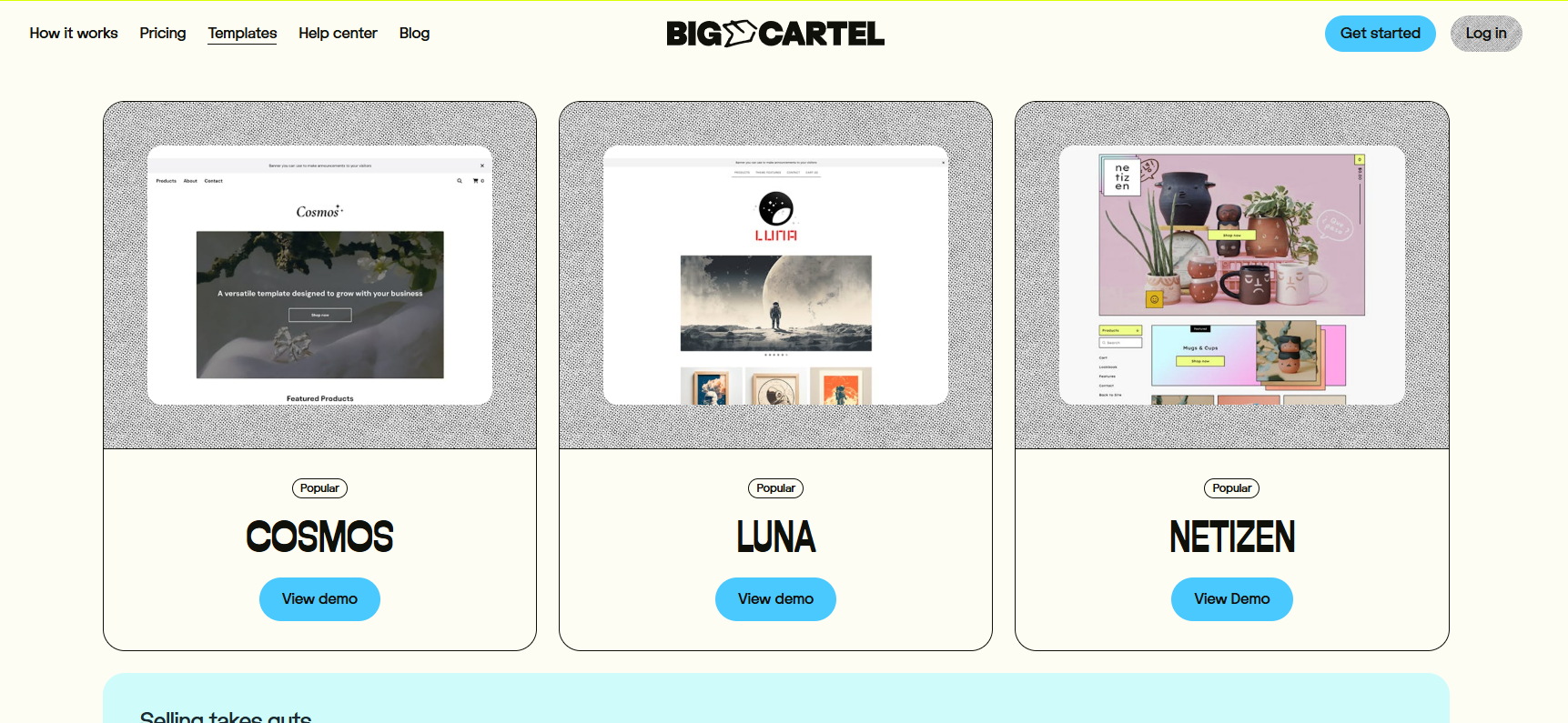
Pros:
- Beginner-friendly setup
- All templates are free
- Rich dropshipping-features including tracking, automated sales tax, secure checkout, and basic analytics
Cons:
- Basic templates.
Dropship Review:
Pricing: Paid plans start at $15/month. Free plan available.
Here’s the breakdown:
Gold – $0. Best for first-time sellers. Includes 5 product listings and 1 image per product.
Platinum – $15/month. Best for growing stores with more inventory and orders. Everything in Gold, plus 50 product listings and 5 images per product.
Diamond – $30/month. Best for scaling stores. Everything in Platinum, plus 500 product listings and 25 images per product.
9. Weebly – Best for Budget-Friendly Stores
Weebly is a website builder and eCommerce platform (owned by Square, Inc.) that allows retailers to create, customize, and run an online store without needing technical expertise. While it doesn’t compete with Shopify or BigCommerce in terms of advanced eCommerce features, what makes Weebly different is its ability to easily sync online storefront with physical store sales—making it an ideal choice for retailers who sell online and in person.
What Weebly helps:
- Build a professional-looking online storefront with drag-and-drop tools.
- Manage products, inventory, and orders from one dashboard.
- Process secure payments directly (through Square Payments) or with other gateways like PayPal and Stripe.
- Handle shipping, taxes, and sales tracking automatically.


Pros:
- Extremely affordable paid plans compared to competitors
- Basic SEO and marketing tools included at no extra cost
Cons:
- Designed only for small app marketplace.
Dropship Review:
Pricing: Paid plans start at $10/month. Free plan available.
Here’s the breakdown:
Free – $0/month. Best for basic use. Includes essential tools to get stores online without any upfront cost.
Personal – $10/month (billed annually) or $13/month (month-to-month). Best for individuals looking to connect their store to a custom domain.
Professional – $12/month (billed annually) or $16/month (month-to-month). Best for sellers who want more customization. Everything in Personal, plus enhanced design options and control.
Performance – $26/month (billed annually) or $29/month (month-to-month). Best for growing brands. Everything in Professional, plus advanced features that help drive growth and streamline operations.
10. Ecwid by Lightspeed – Best for Multi-Channel Selling
Ecwid by Lightspeed is a cloud-based eCommerce platform that urn any existing site or social platform into a fully functional online store. This means retailers can add an online store to any existing website, social media page, or marketplace —they can start selling online immediately without needing to build a new website from scratch.
What Ecwid helps:
- Add unlimited products with multiple variants, images, and descriptions.
- Automatically update stock levels and notify when products are low.
- Sync your store across websites, Facebook, Instagram, Amazon, and eBay.
- iOS and Android apps let retailers manage products, orders, and inventory on the go.
- Support for Stripe, PayPal, Square, and 50+ other gateways, with secure in-cart checkout.


Pros
- Offers a free plan that supports up to 5 products,
- Easily embeds into existing websites
- Sell more with marketing automation
Cons
- Limited customization
Dropship Review:
Pricing: Paid plans begin at $5/month.
Here’s the breakdown:
Starter – $5/month. Best for beginners. Includes up to 5 products, 70+ site templates, default company.site domain.
Venture – $25/month. Best for solo visionaries. Everything in Starter, plus up to 100 products (including digital goods).
Business – $45/month. Best for small teams. Everything in Venture, plus up to 2,500 products, marketplace selling, subscription sales, 2 staff accounts.
Unlimited – $105/month. Best for growing brands. Everything in Business, plus unlimited products, POS integration for in-person sales, unlimited staff accounts.
Which eCommerce Platform is the Best for Dropshipping?
Out of the above options, we recommend Shopify as the best ecommerce selling platform for dropship sellers, both newbies and pros.
Shopify remains as the best due to:
One, its market domination. With over 4.8 million live stores, Shopify leads the global eCommerce market.
Secondly, its simplicity. Shopify is built for anyone to start fast, but still flexible enough to scale into enterprise-level business.
Finally, its extensive dropshipping app ecosystem. Shopify’s 8,000+ apps built to help dropshippers source, fulfill, and optimize profit.
Out of those 8,000+ apps, TrueProfit is a highly-recommended profit tracker app designed specifically for Shopify dropshippers and sellers. It’s a net profit analytics tool that tracks true profit by calculating all ecommerce cost types— so Shopify sellers can make smarter decisions based on profit clarity, not surface-level metrics.
Choosing the best eCommerce platform is the first major step in building a dropshipping business. Remember, there’s no one-size-fits-all solution, each platform comes with its own balance of flexibility, cost, and features. The key is to pick one that aligns with your current needs while still offering room to scale when your store grows.
Leah Tran is a Content Specialist at TrueProfit, where she crafts SEO-driven and data-backed content to help eCommerce merchants understand their true profitability. With a strong background in content writing, research, and editorial content, she focuses on making complex financial and business concepts clear, engaging, and actionable for Shopify merchants.


